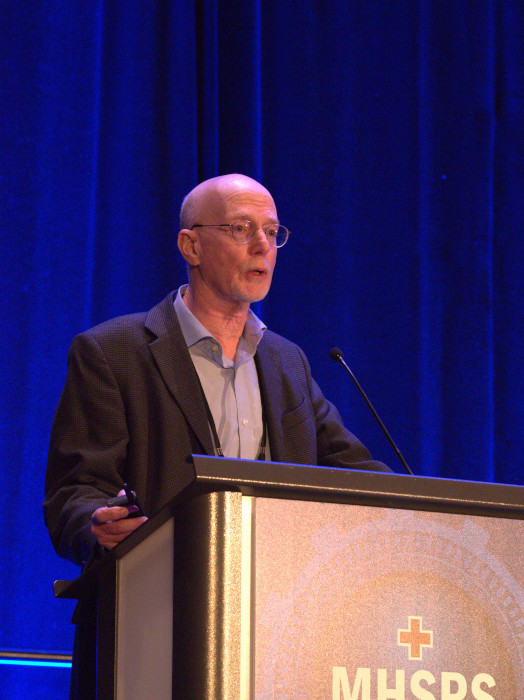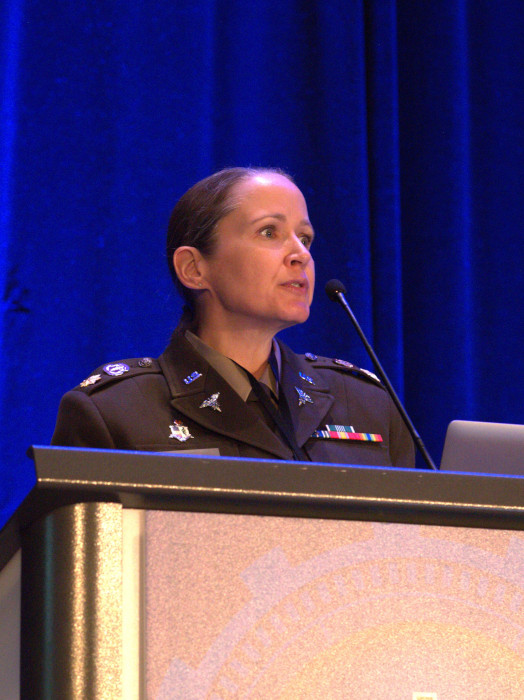DOD Highlights Research to Tackle Warfighter Fatigue

KISSIMMEE, Fla. — Sleep deprivation, and the fatigue that accompanies it, is a fact of life in the military. An estimated two thirds of Service Members do not get enough sleep every night — twice the civilian average. Fatigue can be deadly; an Army study found that the combat effectiveness of Warfighters who get only four hours of sleep a night can drop by up to 85%. At the 2024 Military Health System Research Symposium in Kissimmee, Florida, researchers supported by the U.S. Army Medical Research and Development Command's Military Operational Medicine Research Program discussed innovative ways to help Warfighters improve their sleep management.
Dr. Malena Rone, who manages MOMRP's Joint Fatigue Mitigation and Countermeasures Research portfolio, moderated a panel session titled "Managing Fatigue in the DOD: Methodologies for Sleep and Circadian Measurement" on Aug. 29 that featured researchers from across the military and private sector sharing the results of their latest studies into the physiological changes triggered by fatigue, the measurement of specific physiological characteristics associated with fatigue and the body's circadian rhythm using wearables and other devices, and the development of high-fidelity models of the behavior of the brain and body operating under sleep-deprived conditions.
The Biotechnology High-Performance Computing Software Applications Institute, a component of MRDC's Telemedicine and Advanced Technology Research Center, used MOMRP grant funding to identify patterns in electroencephalograms to identify what makes some people vulnerable to sleep loss and others more resistant to it. Led by Dr. Jaques Reifman, BHSAI's director and senior research scientist, the team conducted four studies during which study participants were given a battery of psychomotor vigilance tests after experiencing sleep deprivation. They looked at the individual's need for sleep over time, clinically termed sleep pressure, and the pattern of brain waves that occur during sleep, called slow wave activity or SWA. Specifically, they looked at the intensity of the SWA, termed its power, and the rate at which that power increases over time, called the slope.
"We found that vulnerable individuals have a persistently higher sleep pressure than resilient individuals under normal rested conditions," Reifman explained. "Furthermore, we can use the power and slope from the first sleep cycle to discriminate between resilient and vulnerable individuals."
Reifman explained that, based on the promising results of this initial study, his team is undertaking additional research to develop models that can be used to test the EEGs of individuals and predict their level of vulnerability or resilience to sleep loss.
"Hopefully I will be invited again next year to talk about our progress with that research," Reifman said.
Maj. Rachell Jones, chief of the operational research team in the Center for Military Psychology and Neuroscience at MRDC's Walter Reed Army Institute of Research, presented the results of her pioneering study into the combined effects of good sleep and supportive leadership during Arctic operations. The study, which also received grant support from MOMRP, followed a group of Warfighters during a training exercise in the Arctic to identify those who were at risk of experiencing cold-weather injury and experiencing a falloff in their performance that could detract from the unit's operational readiness.
Jones explained that anecdotal evidence collected after a 2021 training exercise had suggested that sleep may be a key risk factor in cold-weather injuries, so she and her team — which consisted of researchers from WRAIR, BHSAI and TATRC, wanted to find out what impact sleep restrictions have on Warfighters operating in cold-weather environments. Not only that, but they wanted to identify what leaders could do to mitigate risk to the Warfighters under their command.

"We all hear the words that sleep is important, but a lot of Soldiers don't get that message," Jones said. "What we try to hammer home to Soldiers is how that translates into operational metrics. You may be slower to identify targets, or you may be too slow to avoid an attack. For medical folks, it could mean the difference between life and death when performing a surgical operation."
The researchers surveyed Warfighters to identify the stressors that affect their performance in cold weather, such as depression, anxiety, substance abuse, physical injury and the effects of cold on their ability to perform routine and mission-oriented tasks. They also collected detailed data on how the Warfighters rated the comfort and warmth of their sleep systems while on patrol and back at base.
Jones reported that Warfighters who slept less than seven hours per night were more than twice as likely to report a health problem during the training exercise, while those who reported having their sleep disturbed by feeling too cold were five times more likely. Conversely, positive attitudes towards Alaska were linked to a reduced risk of behavioral health problems. Interestingly, Warfighters reported feeling more prepared to deal with the cold than the prolonged darkness of wintertime in the Arctic.
In addition to providing a refined frostbite risk algorithm that leaders can use in the field to ensure their teams are adequately protected, the team used the results of their study to develop a sleep-related risk estimate for mission planning in the Arctic region and to provide detailed recommendations for the minimum sleep needed during cold-weather missions.
In sharing the results and recommendations with officers, Jones said that she was encouraged by how eager they were to put that information to use to improve the health, safety and fighting effectiveness of the Warfighters under their command.
"The bottom line is that sleep needs to be conceptualized as a force multiplier, to ensure that we're arming our Soldiers and leaders with the tools they need to be the most effective they can be," Jones said. "Leaders can help by promoting sleep hygiene, leading to greater buy-in, which is needed to make the cultural shift to recognize the importance of sleep to the mission."
MHSRS is the DOD's premier medical science research and development meeting. Over 4,000 people representing the military, academia, private industry and international partners attended the event to learn about the latest advances and initiatives in health care research related to combat casualty care, military operational medicine, clinical rehabilitation, information science, infectious diseases and radiation health effects. Many military and civilian representatives from across MRDC participated in the symposium as panelists and presenters.
 An official website of the United States government
An official website of the United States government
 ) or https:// means you've safely connected to the .mil website. Share sensitive information only on official, secure websites.
) or https:// means you've safely connected to the .mil website. Share sensitive information only on official, secure websites.


